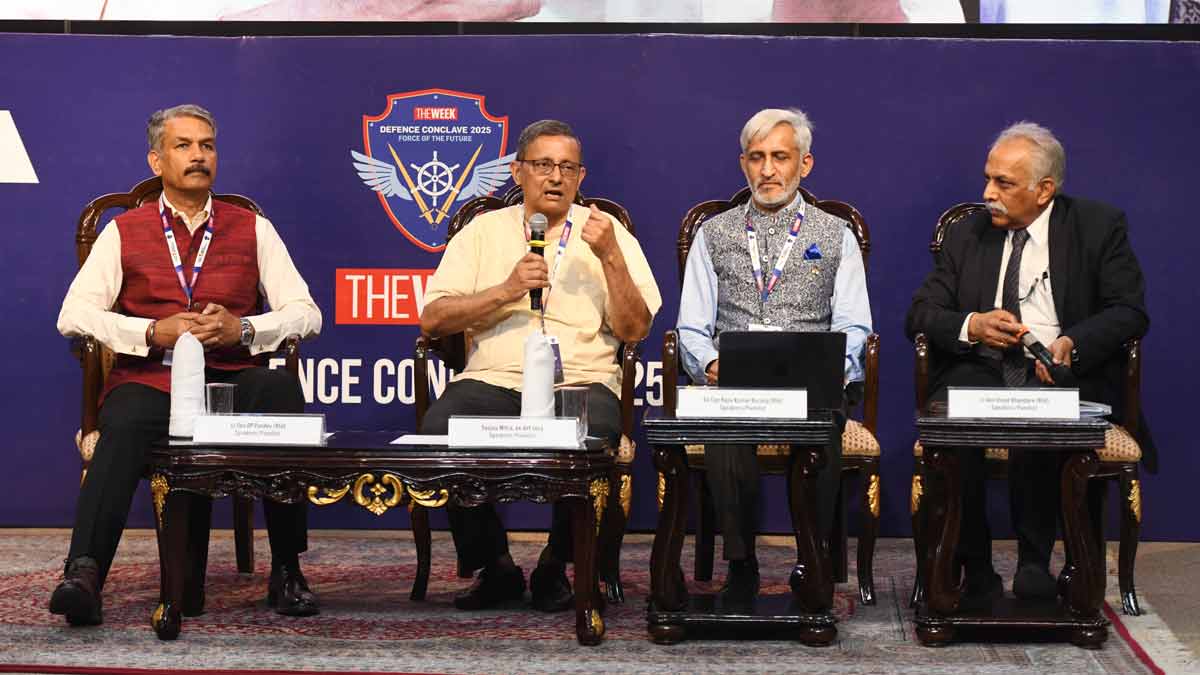‘No international bodies remain to put an end to wars’: Experts at THE WEEK Defence Conclave 2025
 The first panel discussion of THE WEEK Defence Conclave 2025 in New Delhi, titled ‘Momentous Changes: Defence Reforms’ | Sanjay Ahlawat
The first panel discussion of THE WEEK Defence Conclave 2025 in New Delhi, titled ‘Momentous Changes: Defence Reforms’ | Sanjay AhlawatTitled ‘Momentous Changes: Defence Reforms’, the first panel discussion of THE WEEK Defence Conclave 2025 in New Delhi, supported by the defence ministry, focused on reforms in the defence sector.
The session was moderated by former Defence Secretary Sanjay Mitra. Panellists included Lieutenant General Vinod Khandare (Retd), former adviser to the Ministry of Defence and ex-DG, DIA Lieutenant General D.P. Pandey (Retd), who was commandant of the Army War College, Mhow, and Group Captain (Dr) Rajiv Kumar Narang (Retd), Senior Fellow at the Manohar Parrikar Institute for Defence Studies and Analyses (MP-IDSA).
In his opening remarks, Mitra highlighted the urgent need for structural and policy-level reforms to modernise India’s defence apparatus.
Lieutenant General Vinod Khandare emphasised that reforms are neither a one-off event nor a short-term endeavour—they are a continuous process that must build on the past and prepare for the future. “The era of ‘no war’ is over, and conflicts are no longer short-lived,” he said. He also pointed out that the international community seemed more focused on selling defence products than promoting peace, citing examples of the ongoing wars in Ukraine and the Middle East. “This is why Atmanirbharta, or self-reliance, is critical,” he said.
Khandare stressed that indigenisation must be a whole-of-government effort, not the responsibility of the defence ministry alone. Among other priorities, he highlighted the corporatisation of key sectors such as ordnance factories; ending the compartmentalisation between defence attachés and ambassadors in embassies; increasing international engagement and market outreach; focusing on emerging domains such as space and cyber; and encouraging private sector participation in the defence ecosystem.
Lieutenant General D.P. Pandey provided a practitioner’s view of defence reforms. He challenged the notion that warfare would become less violent, arguing that due to global power asymmetries, the spread of radical ideologies, and challenges like climate change, warfare has in fact become more brutal. “The next war will span all domains—land, air, sea, cyber—and will involve proxies, paramilitary forces, and cyber actors. It will not be limited to conventional military engagements,” he said.
He also highlighted the growing importance of the information domain, or “mindspace”, in modern conflict. “Future wars will be defined by the widespread use of drones and hypersonic weapons, increasing both range and lethality. These developments have eroded even the concept of nuclear deterrence,” he warned.
Group Captain (Retd) Rajiv Kumar Narang focused on the role of technology in driving reform. He proposed that defence verticals be treated as equal stakeholders in all reform processes, including initiatives promoting tri-service integration. He also called for reforms within the Indian Administrative Service (IAS), suggesting the creation of a technical branch to better address defence-related needs.
Another significant proposal was the establishment of a Defence and Aeronautical Commission to oversee procurement and policy matters. He further recommended that the Ministry of Civil Aviation take ownership of the civil aeronautics sector, advocating for greater technological synergy between civil and military domains.
All three panellists agreed on the urgent need for defence sector reforms, noting that no foreign power is likely to transfer its critical technologies to India. They also pointed out that the global military-industrial complex has little interest in ending conflicts, and that there currently exists no competent international organisation dedicated to preventing wars. As such, India must strive to achieve Atmanirbharta in defence at the earliest possible time.
Defence